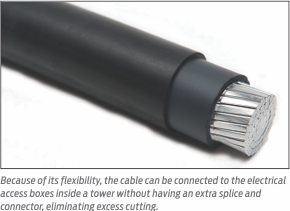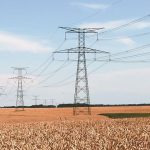One of the benefits of the Southwire cable include the ease of installation, wherein the multi-strand aluminum cable is more flexible than similar aluminum cables, which makes it easier to install. In addition, the CPE outer layer will allow clamps to grip, which also contributes to ease of installation.
May 23, 2017
 Southwire has launched a new multi-strand, high-quality aluminum cable with installation, cost and safety advantages that make it particularly suitable for down tower wind turbine applications.
Southwire has launched a new multi-strand, high-quality aluminum cable with installation, cost and safety advantages that make it particularly suitable for down tower wind turbine applications.
“The wind industry is expected to continue its robust growth as a top source of renewable energy generating capacity in the country,” said Brad Pollard, OEM sales manager. “The addition of this new down tower cable expands our product line in a key area and demonstrates our commitment to ongoing innovation for our customers.”
Southwire’s aluminum down tower cable is composed of three layers – first, 8000 Series Aluminum conductor per ASTM B800, Class C Compact strand per ASTM B801 or Single Input Wire stranding per ASTM B836; second, Mylar binder tape; third, two-layer composite wall insulation, with an EPDM (Ethylene Propylene Diene Monomer) inner layer and a CPE (Chlorinated Polyethylene) outer layer.
One of the benefits of the Southwire cable include the ease of installation, wherein the multi-strand aluminum cable is more flexible than similar aluminum cables, which makes it easier to install. In addition, the CPE outer layer will allow clamps to grip, which also contributes to ease of installation. Further, lower cost is another advantage because, generally speaking, aluminum is a less expensive metal than copper. The product has been tested to common oils that are used in wind turbines per manufacturers’ requirements in Southwire’s labs. Because of its flexibility, the cable can be connected to the electrical access boxes inside a tower without having an extra splice and connector, eliminating excess cutting.
America’s wind industry recently recorded its best start in eight years, installing 908 utility-scale turbines and switching on more megawatts in the first quarter of 2017 than the first three quarters of 2016 combined, according to a report released this month by the American Wind Energy Association (AWEA). Similarly, Navigant Consulting has forecast a strong 2017 for wind power.




